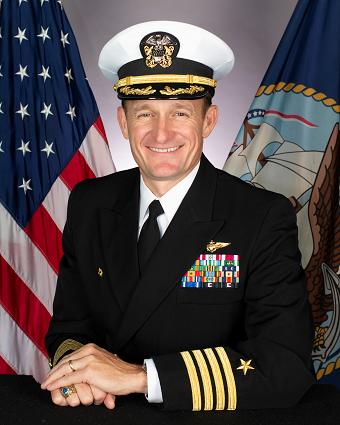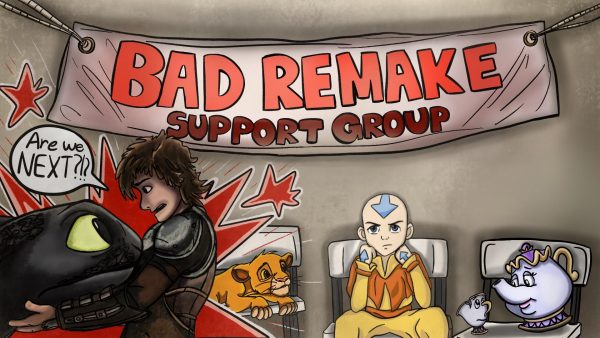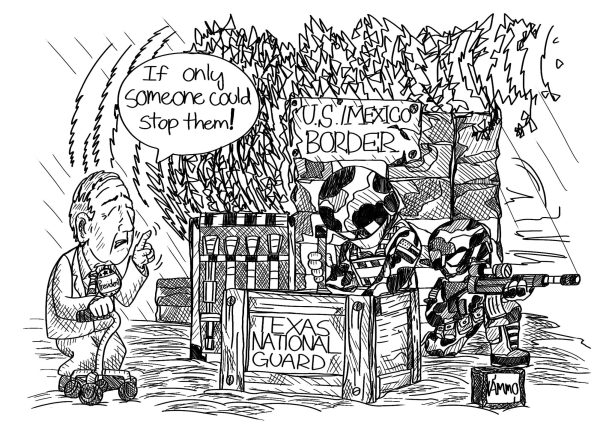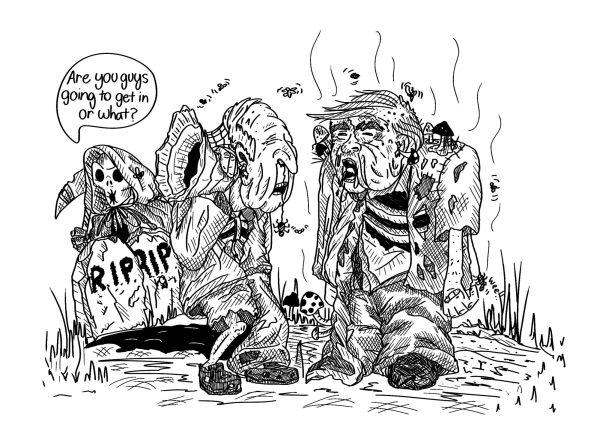“Our Most Trusted Asset”: COVID-19, the US Navy, and the Absence of Trust

Capt. Brett E. Crozier (Photo courtesy of U.S. Navy)
April 23, 2020
When Captain Brett Crozier, Commanding Officer of the aircraft carrier USS Roosevelt, emailed a letter to 20 of his peers and direct superiors requesting to dock his ship in Guam following the COVID-19 outbreak that affected the crew, he was extending a plea that transcended his own desire to some day make Admiral. Well-loved by his present and previous commands, Capt. Crozier was leading a deployment to the Pacific Fleet when the coronavirus struck his ship following a port visit to Vietnam two weeks prior. Due to the crowded and cramped conditions on board, the virus spread quickly; “social distancing” isn’t exactly an option when you’re stuck with 4,000 other people on a giant floating flight deck.
However, Capt. Crozier’s request to dock in Guam was the best possible solution within reason to what was a quickly evolving crisis. Returning stateside would have left the Pacific fleet unprotected, but staying afloat would have led to an even more deadly outbreak; currently one sailor has died and 660 others have contracted the virus. The letter, written on March 31, was exclusively obtained by the San Francisco Chronicle, and leaked to the public from an unknown source. This led to pressure on upper military officials to respond swiftly amid questions of safety and sanitation. The condescending remarks of Navy Secretary Thomas Modly toward a Commanding Officer trying to protect his people represents a larger issue in the world of active duty Navy personnel.
Of course, it’s easy to immediately look sideways at those who have no military experience and speak on the matter. People admire the uniform from afar and say “thank you for your service” automatically, as reflexively as saying “bless you” or “you’re welcome.” Unless you’ve been on a flight deck in 90 degree weather with a float coat, cranial, tool pouch, long sleeved turtleneck, and the exhaust from dozens of taxiing aircraft burning your back, can you understand how personal it is? During my years in the navy, I went on multiple detachments and grew accustomed to the rapid pace of a typical workday. However, nothing could have truly prepared me for the added pressure, stress, and confinement of deployment, until I was actually in it.
Sailors get told words like “mission” and “readiness” until it becomes ingrained. We are taught from Day One to have each others’ backs. This is actually natural for some of us, an instinct that leads us to willingly suffer through endless safety briefs, click through repetitive warnings and notes during maintenance, and practice hundreds of drills for every possible situation, probable or not. Our rank allows us to protect each other, at least on the enlisted level. That begs the question: who from the top takes care of us as a whole? Since enlisted military are not allowed to dissent or refuse to perform their duties, it lies on senior officials to protect them and act on their behalf in times of need. Capt. Crozier is a leader and he acted like one. His actions undoubtedly saved hundreds of lives, though at great personal cost.
Capt. Crozier’s letter entreated upper Navy officials to act quickly to prevent the spread of illness and allow an orderly quarantine offboard the ship, leaving a skeleton crew onboard to commence sanitizing every surface and allow for the crew to recover effectively. “This will require a political solution but it is the right thing to do,” he wrote. “We are not at war. Sailors do not need to die. If we do not act now, we are failing to properly take care of our most trusted asset – our Sailors.” His high rank and outstanding reputation did not protect him from the fate that befalls many who ask for help in the Navy: he was berated, then unceremoniously removed from his command.
After Capt. Crozier’s removal, Secretary Modly flew out to the USS Roosevelt to address sailors directly, spending approximately 30 minutes onboard and costing taxpayers a quarter of a million dollars for the trip. He implied that Capt. Crozier had leaked his letter intentionally to the press, stating, “If he didn’t think that information was going to get out to the public, then he was either too naive or too stupid to be a commanding officer of a ship like this or he did this on purpose.” The fact that a commander of an aircraft carrier faced such backlash over an accusation that has yet to be proven magnifies the distrust between active duty military and civilian officials.
He went on to criticize the crew for supporting Captain Crozier. The level of disrespect directed towards the widely admired leader of sailors already suffering with low morale and uncertainty was nothing short of infuriating, uniting sailors, veterans, and military families across the country against him. His words are especially astounding given that Secretary Modly was himself an active duty officer in the Navy for seven years as a helicopter pilot. Clearly, he forgot where he came from.
Military members are expected to carry out their duty and be prepared for anything at any given moment, and rightfully so. They cannot protest openly in uniform and must be careful what they share on social media to avoid disciplinary action. The seriousness of the job and uniform necessitates such laws, and I agree that personal opinions and fears need to be kept separate from duty and the work at hand. The USS Roosevelt is on deployment and, wartime or not, it has a mission to complete and that mission must come first.
I believe that although the Navy is strong in capability and sailors perform their missions with professionalism and strength, the truth is that there is a widening disconnect and distrust that cannot improve without an open conversation. I have witnessed sailors ask for help and be punished swiftly and publicly for speaking out, a situation that applies here as well. How are we supposed to trust the missions we are assigned, and for which we willingly put ourselves in danger, when the ones sending us on deployments are gravely out of touch with conditions pertaining to our very health and safety?
It is rare that a commander defends his crew as fiercely as Capt. Crozier did, and his command showed much pride and affection for him, from online petitions to an emotional video of cheers as he made his last journey down the ramp. I’m proud that I served with people like him, and angry at the treatment he received. The fact remains that he was punished and scorned for taking action. If sailors are considered an “asset,” where does their duty end and human value begin? What message does that send to lower enlisted members? At a time when multiple crises are leaving ugly scars across the military establishment – sexual assault, an ever rising suicide rate, alcoholism – the failure of Big Navy to protect sailors and their families is a disappointing but unsurprising answer.












































































Donna Smith • Apr 29, 2020 at 11:56 am
Sarah Bergman did a terrific job of detailing this truly disgraceful treatment of a highly respected naval commander who was doing his sworn duty to best protect his crew.
I am waiting to see what is next here… will he he resume command?
Donna Smith